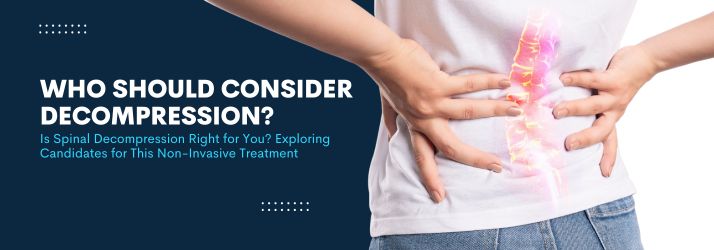Who Should Consider Decompression in CITY* STATE*
Who should consider decompression?

Spinal decompression is a non-surgical, non-invasive treatment option for individuals suffering from various spinal conditions that cause back pain and discomfort. By gently stretching the spine, this therapy can relieve pressure on spinal discs and nerves, promoting healing and alleviating pain. However, spinal decompression may not be suitable for everyone. In this article, we will discuss who should consider spinal decompression as a treatment protocol and the factors that may determine its suitability.
Candidates for Spinal Decompression
Spinal decompression therapy can be beneficial for individuals experiencing pain and discomfort due to the following spinal conditions:
- Herniated or bulging discs: Spinal decompression can create negative pressure within the intervertebral discs, helping to retract herniated or bulging discs and reducing pressure on spinal nerves.
- Degenerative disc disease: By improving the flow of oxygen, nutrients, and other essential substances to the spinal discs, spinal decompression can promote healing and reduce inflammation associated with degenerative disc disease.
- Sciatica: Spinal decompression can help alleviate the pain and discomfort associated with sciatica by reducing pressure on the compressed spinal nerves.
- Spinal stenosis: By stretching the spine and relieving pressure on the spinal nerves, spinal decompression can help alleviate pain and discomfort caused by spinal stenosis.
- Facet joint syndrome: Spinal decompression can help reduce pressure on the facet joints, alleviating pain and improving mobility.
Factors to Consider Before Undergoing Spinal Decompression
While spinal decompression can be an effective treatment option for many individuals, certain factors may influence its suitability:
- Medical history: Before undergoing spinal decompression therapy, it is essential to discuss your medical history with a healthcare professional to determine if you are a suitable candidate. Some pre-existing conditions, such as osteoporosis, spinal tumors, or severe spinal instability, may contraindicate spinal decompression therapy.
- Severity of the condition: The severity of your spinal condition may influence the effectiveness of spinal decompression therapy. While the treatment can be beneficial for mild to moderate spinal conditions, more severe cases may require alternative or additional treatments, such as surgery or pain management interventions.
- Previous treatments: If you have previously undergone spinal surgery or other treatments for your spinal condition, it is crucial to consult with a healthcare professional to determine if spinal decompression therapy is a viable option for you.
Spinal decompression therapy can be an effective treatment option for individuals suffering from various spinal conditions, such as herniated discs, degenerative disc disease, sciatica, spinal stenosis, and facet joint syndrome. However, it is essential to consult with a healthcare professional to determine if you are a suitable candidate for this non-invasive treatment. By carefully considering your medical history, the severity of your condition, and any previous treatments, a healthcare professional can help you make an informed decision about whether spinal decompression therapy is the right treatment protocol for your needs.
OFFICE HOURS
Monday
8:00am - 12:00pm
1:00pm - 6:00pm
Tuesday
8:00am - 6:00pm
Wednesday
8:00pm - 6:00pm
Thursday
8:00am - 6:00pm
Friday
8:00am - 6:00pm
Saturday & Sunday
Closed
CLINIC NAME*
ADDRESS*
CITY*, STATE* ZIP*
(000) 000-0000


